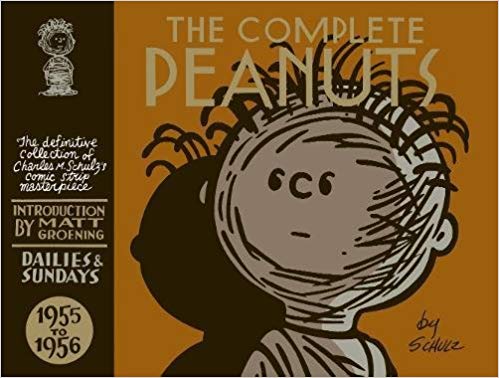
By Charles Schulz (Canongate Books/Fantagraphics Books)
ISBN: 978-1-84767-075-5 (Canongate HB):Â Â Â Â Â Â Â Â Â Â Â Â 978-1-56097-647-9 (Fantagraphics HB)
Peanuts is unequivocally the most important comics strip in the history of graphic narrative. It is also the most deeply personal. At its height, the strip ran in 2,600 newspapers in 75 countries, translated into 21 languages. Many of those venues are still running perpetual reprints, as they have ever since Schulz’ departure. Book collections, a merchandising mountain and television spin-offs made the publicity-shy artist a billionaire.
Cartoonist Charles M Schulz crafted his moodily hilarious, hysterically introspective, shockingly philosophical epic for half a century. During that time he published 17,897 strips from October 2nd 1950 to February 13th 2000, and died – from the complications of cancer – the day before his last strip was printed…
None of that is really the point. Peanuts – a title Schulz loathed, but one the syndicate imposed upon him – changed the way newspaper strips were received and perceived, and proved that cartoon comedy could have edges and nuance as well as pratfalls and punch lines.
Following a heartfelt and clearly awestruck Foreword from contemporary cartoon genius Matt Groening, this third gargantuan landscape hardback compendium (218 by 33 by 172 mm in the solid world and infinitely variable in its digital iterations) offers in potent monochrome the fifth and sixth years in the life of Charlie Brown and Co: an ever-evolving bombardment of cruel insight and bitingly barbed hilarity.
Here our increasing browbeaten but resolutely optimistic little round head and his high-maintenance mutt Snoopy respond with increasing bewilderment to the rapidly changing world of TV, sports, games and especially peers who seem designed only to vex, belittle or embarrass the introspective everyboy.
Gaining far greater prominence is obnoxious “fussbudget†Lucy who, with her infant sibling Linus – an actual architectural idiot savant – are getting more and more of the best lines and set-ups. Another up and comer settling in (amidst a cloud of dust and detritus) is hapless toxic innocent ‘Pig-Pen’: a sad clown in the grand manner, buffeted by a cruel condition but manfully persevering throughout…
Bombastic Shermy and mercurial Patty are slowly being eased out, and brusque Violet is slowly losing ground to gags starring Beethoven-obsessed, long-suffering musical prodigy Schroeder. Linus’ mystic tranquiliser the Security Blanket also gains greater prominence, but his anxiety peaks exponentially whenever raucous, strident newcomer Charlotte Braun ambles by…
The daily diet of rapid-fire gags had now successfully evolved from raucous slapstick to surreal, edgy, psychologically honed introspection, crushing peer-judgements and deep rumination in a world where kids – and certain animals – were the only actors, although even inanimate objects occasionally got into the action with malice aforethought…
The relationships, however, were ever-evolving: deep, complex and absorbing even though “Sparky†Schulz never deviated from his core message to entertain…
The first Sunday page had debuted on January 6th 1952: a standard half-page slot offering more measured fare than the daily. Both thwarted ambition and explosive frustration became part of the strip’s signature denouements and continue to develop here. There are some pure gem examples of running gag mastery in here too, regarding Lucy’s ongoing relationship to certain snowmen of her own macabre devising and mounting jealousy that her predestined inamorata would rather look at plaster busts of Beethoven than upon her living form…
Perennial touchstones on display herein include playing, playing pranks, playing sports, playing golf, playing baseball, playing in mud, playing in snow, playing musical instruments, playing marbles, the rules of croquet, learning to read, coping with increasingly intransigent if not actually malevolent kites, teasing each other, making baffled observations and occasionally acting a bit too much like grown-ups.
New themes include America’s fascination with flying saucers, ditto for TV sensation Davy Crockett, art appreciation and Snoopy’s growing desire to be anything but a maligned and put-upon little dog. Especially one starved of tasty treats and bonbons…
The soft-soap ostracization of Charlie Brown and his expressions of alienation are well explored but in truth Lucy is the real star here, with episodes seeing her seeking to become Mayor of the United States, duelling Snoopy with skipping ropes and investigating the mystery of why the planet is getting smaller…
More exploration of Snoopy’s incredible inner mindscape can be seen here and there are plenty of season-appropriate gags about summer sun, winter snow and the Fall of leaves as well as riffs on festive events such as Halloween, Easter and Christmas. During this time Good Ol’ Charlie starts getting those stress-induced head and stomach aches…
And best of all, auteur Schulz is in brilliant imaginative form crafting a myriad of purely graphic visual gags any surrealist would give their nose-teeth to have come up with…
Now and forevermore Charlie Brown – although still a benign dreamer with his eyes affably affixed on the stars – is solidly locked on the path to his eternal loser, singled-out-by-fate persona and the sheer diabolical wilfulness of Lucy starts sharpening itself on everyone around her…
Adding to the enjoyment and elucidation, a copious ‘Index’ offers instant access to favourite scenes you’d like to see again, after which Gary Groth reviews the life of ‘Charles M. Schulz: 1922-2000’, rounding out our glimpse of the dolorous graphic genius with intimate revelations and reminiscences…
Still readily available, this volume offers the perfect example of a masterpiece in motion: comedy gold and social glue gradually metamorphosing in an epic of spellbinding graphic mastery which became part of the fabric of billions of lives, and which continues to do so long after its maker’s passing.
How can you possibly resist?
The Complete Peanuts: 1955-1956 (Volume Three) © 2004 Peanuts Worldwide, LLC. Foreword © 2005 Matt Groening. “Charles M. Schulz: 1922 to 2000†© 2004 Gary Groth. All rights reserved.
